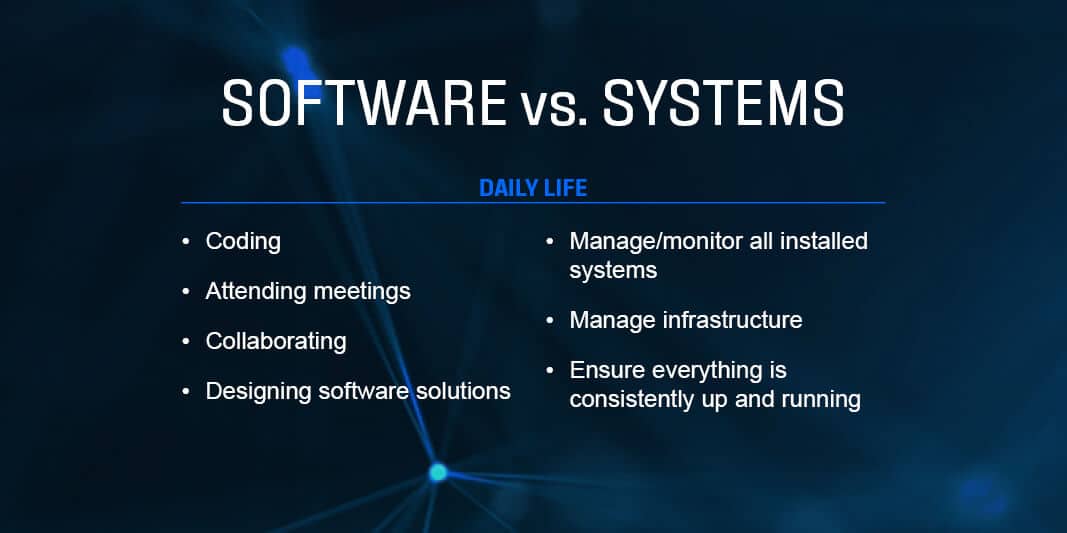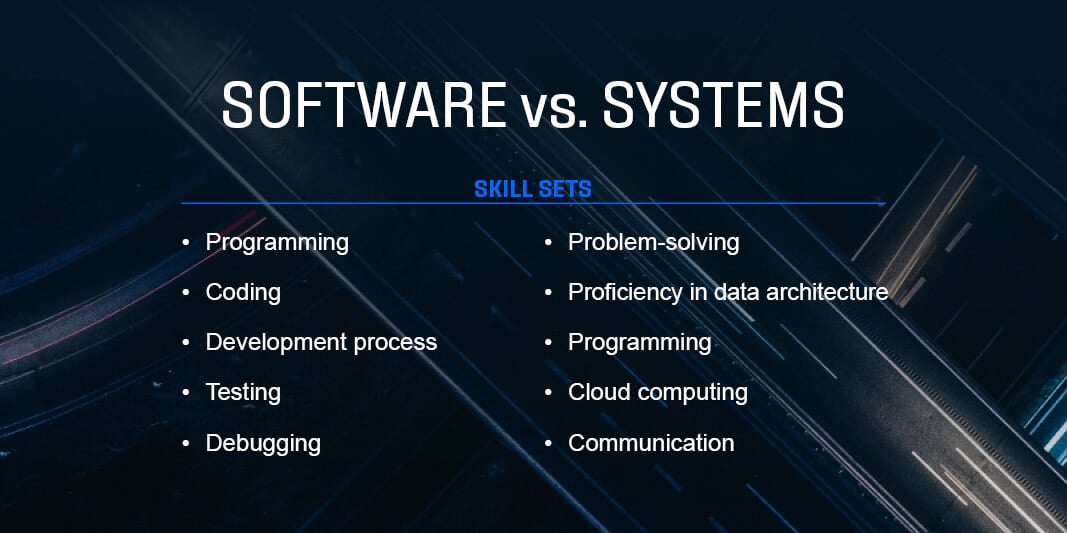Key Differences Between a Software Engineer vs. Systems Engineer
Employee Insights, Job Seekers

With similar job titles and skill sets, there is often confusion between the software engineer and systems engineer roles. Both are highly skilled, technical roles in the IT industry, but there are several key differences between these roles and how they function. Let’s examine at the basic job descriptions of both software and systems engineers, along with some key differences between these two roles.
What is a Software Engineer?
A software engineer is a professional who designs and develops software applications and products. This overarching engineering role follows a step-by-step approach for the entire software development lifecycle and is involved in every aspect from design to development to deployment and maintenance.
A software engineer uses methods like process modeling, incremental verification and validation, process improvement, agile methods, and continuous integration during their work. A software engineer can expect an average salary of $105,195 annually, and there are an estimated 4.4 million software engineering jobs in the U.S.
What is a Systems Engineer?
In an equally important role, a systems engineer deals with the overall management of engineering projects during their life cycle, particularly regarding physical aspects. This role is focused on all aspects of computer-based system development.
In this role, you might use methods like stakeholder analysis, interface specifications, design trade-offs, configuration management, systematic verification and validation, and requirements engineering.
There are approximately 450,000 systems engineers currently employed in the U.S., with an average base salary of $110,620 per year.
What Are the Key Differences Between a Software Engineer and a Systems Engineer?
Now that you know the basic job descriptions, it’s important to understand some significant nuances in these two roles. From actual day-to-day tasks to educational background, these two complementary positions have some key differences.
1. Daily Tasks & Job Description
Most importantly, the day-to-day life and tasks of a software engineer and a systems engineer are very different. A software engineer spends a large part of their day coding, attending meetings, and collaborating with peers. They typically work on several development projects at once and spend most of their day designing software solutions.
A systems engineer does not perform coding and web application development like a software engineer. Instead, they manage and monitor all installed systems and infrastructure, ensuring everything is consistently up and running.
2. Education
While these two job roles are often connected, their educational background is usually different. Systems engineers typically have a broader education background in engineering, mathematics, or computer science. Software engineers require a more targeted technical background in a field like computer science or computer engineering.
3. End Project Goal
Systems engineers mainly focus on users and domains, while software engineers are mostly focused on developing powerful, intuitive software for the end user, concerned with usability, timelines, and delivering an application at the end of a project. Systems engineers deal with the entire project engineering lifecycle while software engineers focus on the design and development of individual products.
4. Skill Sets Required
A major difference in these two roles boils down to skill sets. Systems engineers need problem-solving skills, proficiency in data architecture, programming skills, cloud computing knowledge, network experience, communication skills, and customer service skills. They should also be well-versed in troubleshooting, analysis, networks, and system designs.
Software engineers require a wide skill set in computer programming and coding. Different types of developer roles require different programming languages. Still, all software engineers need to be knowledgeable about the development process, testing, and debugging. They also need to have strong written and verbal communication skills as they work in large teams.
At a Glance: Differences Between a Software Engineer vs Systems Engineer
-
Job Description:
A software engineer is responsible for designing, developing, and maintaining software applications, whereas a systems engineer is responsible for designing and maintaining complex systems and ensuring they work seamlessly.
-
Focus:
A software engineer focuses primarily on software development, programming, and testing, while a systems engineer focuses on the design, integration, and maintenance of different systems.
-
Knowledge:
A software engineer should have expertise in programming languages, software development tools, and operating systems. A systems engineer should have a broader knowledge of hardware, software, and networking technologies.
-
Roles and Responsibilities:
A software engineer is typically responsible for coding, testing, debugging, and optimizing software applications. A systems engineer is responsible for designing, testing, and integrating complex systems and troubleshooting problems that arise.
-
Scope of Work:
A software engineer is involved in the entire software development life cycle, from requirement gathering to testing and maintenance. A systems engineer is involved in the complete system development life cycle, from requirement gathering to system deployment and maintenance.
-
Skillset:
A software engineer must have excellent coding skills, experience with software development methodologies, and knowledge of software testing and debugging tools. A systems engineer should have skills in systems thinking, design, and integration, as well as knowledge of system-level testing and debugging tools.
-
Industry Focus:
Software engineers are typically employed in software development companies, while systems engineers are more often employed in various industries such as aerospace, defense, automotive, and telecommunications.
Can a Systems Engineer Be a Software Engineer?
Yes, a systems engineer can also work as a software engineer as they possess the skills required for software development. However, a systems engineer is more focused on designing, building, and maintaining complex systems, while a software engineer is more focused on writing, testing, and debugging software code.
The roles may overlap in some areas, but they require different skills and have different responsibilities. Therefore, it is possible for someone to work as both a systems engineer and a software engineer, but they may have different job titles or work on different projects depending on their skills and experience.
Career Advancement Ladders for Software Engineers & Systems Engineers
The career ladder for a software engineer and a systems engineer may differ based on the organization and industry they work in.
For software engineers, the typical career progression begins with the role of Junior Software Engineer to Software Engineer, Senior Software Engineer, Lead Software Engineer, Principal Software Engineer, and then Staff or Distinguished Engineer.
For systems engineers, the career ladder may start at Junior Systems Engineer, then Systems Engineer, Senior Systems Engineer, Lead Systems Engineer, Principal Systems Engineer, and then Chief Systems Engineer or System Architecture Manager.
It’s important to note that some organizations may use different titles or have variations in their career ladders, and career progression can also depend on an individual’s skills, experience, and performance.
Systems engineers can expect to see a 9.3% job market growth over the next few years. However, software engineering is expected to grow at more than triple that rate, with a 30.7% expected job growth rate over the next few years, making it one of the most in-demand tech positions.
Apply for Systems Engineer and Software Engineer Positions
INSPYR Solutions hires for an elite roster of clients, ensuring you have access to some of the best tech jobs in the industry. Apply to our open software engineer and systems engineer positions today to get started.
Share This Article
Contact Us
We’re here for you when you need us. How can we help you today?









